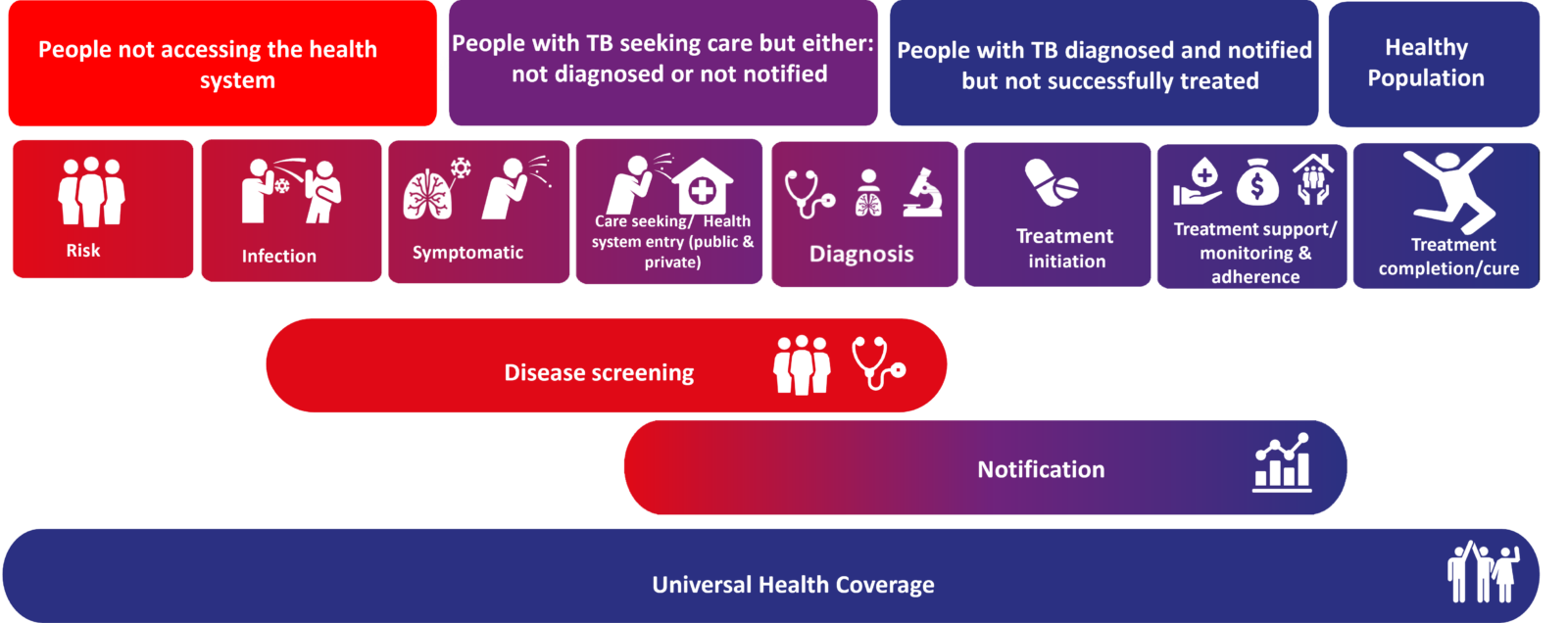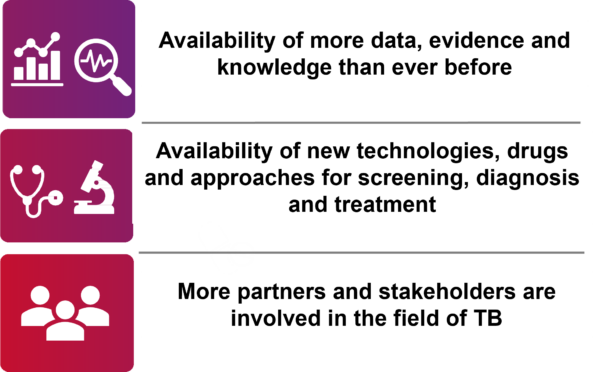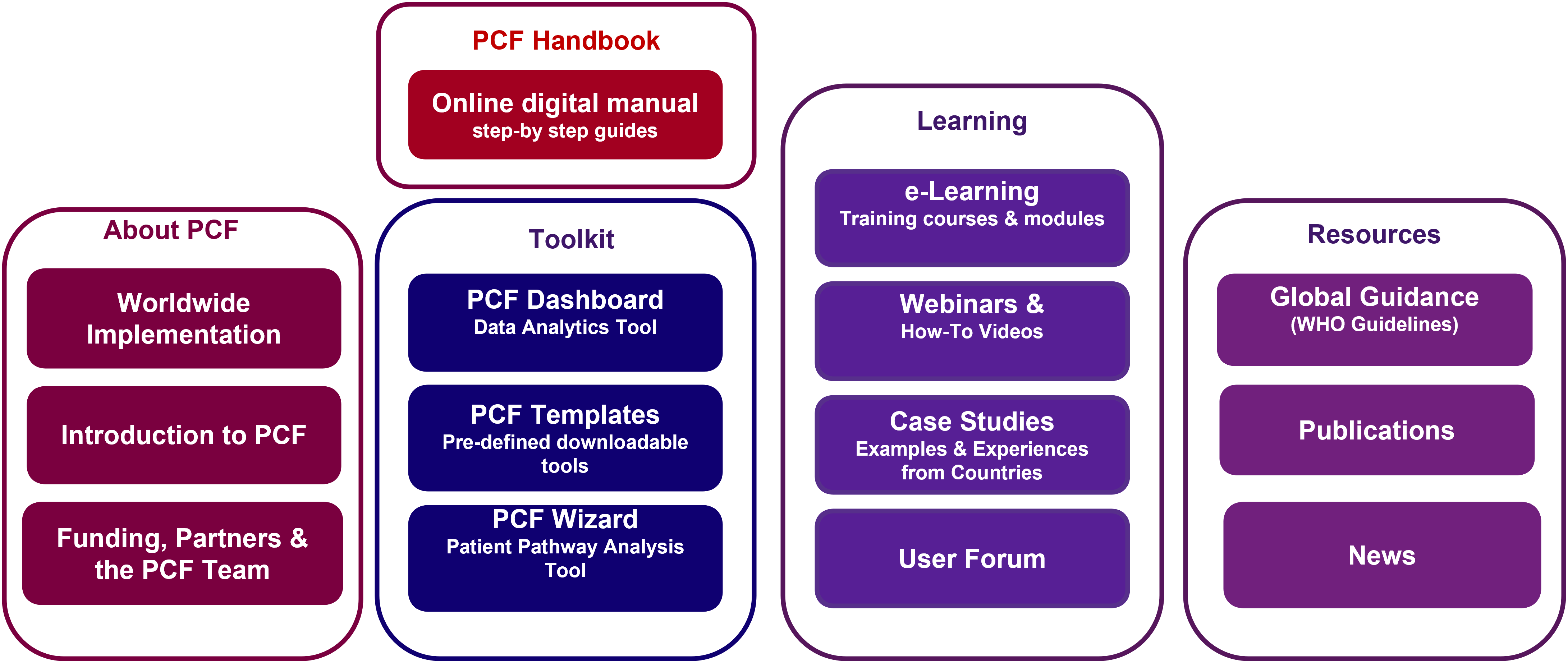PCF Introduction, Background & Philosophy
The People-Centred Framework for TB programming was jointly developed by the Bill and Melinda Gates Foundation, The Royal Tropical Institute Netherlands (KIT), the World Health Organization (WHO), Linksbridge, TB Modelling and Analysis Consortium (TB MAC), and refined by KNCV to provide countries with the necessary tools and approaches to optimize their National Strategic Plans in line with the End TB Strategy, Sustainable Development Goals and country commitments.

The PCF approach was first presented as a White Paper titled “Improving the Use of Evidence for TB Program Planning: a framework for people-centred data consolidation and policy translation at the WHO Global Task Force on TB Impact Measurement” – Seventh Task Force meeting, 1-4 May 2018, in Glion-sur-Montreux, Switzerland.
The ensuing People-Centred Framework for National Strategic Planning (PCF4NSP) project funded by the Gates Foundation and implemented by KNCV built on the principles of the People-Centred Framework for TB programming and the experiences from the use of data consolidation and policy translation across the TB care continuum as partially piloted in 4 countries and the principles described in the White Paper.

The PCF Approach is a powerful tool in the fight against TB, enabling countries to develop and implement optimized, responsive, and resilient National Strategic Plans (NSPs) for TB programming. By aligning with the WHO End TB Strategy and the Sustainable Development Goals, we aim to accelerate progress in the fight against TB. The WHO End TB Strategy can be found here: Global Tuberculosis Programme (who.int)
The PCF Knowledge Management Hub serves as a practical guide and toolbox for policymakers, providing step-by-step guidance and tools based on the experiences and inputs from 10 early adopter countries during the 2019-2020 period. The Hub also provides a user forum for peer-to-peer support, complementary to the WHO People-centred framework for tuberculosis programme planning and prioritization, User guide published in 2019, which can be found here: https://www.who.int/publications/i/item/9789240010715, and the recently published WHO guidance on NSP development (September 2022) which can be found here: https://www.who.int/publications/i/item/9789240010722. By providing better knowledge and resources, we enable policymakers to achieve better outcomes in the fight against TB.
The People Centred Framework effectively uses great advances in the fight against TB in recent years, these include:

Usefulness assessment and capacity building
The PCF Knowledge Hub is a linking and learning platform designed to help policymakers in high-burden TB countries effectively tackle the epidemic and achieve better outcomes. The project was developed to strengthen the capacity at the country level in the areas of data analysis, interpretation, presentation, and utilization for decision-making. By actively co-designing and creating tools and processes tailored to country needs with selected early adopter countries, we ensure the approach is relevant and effective.
The Knowledge Hub serves as a one-stop-shop for the PCF Community of Practice, providing access to all relevant resources, tools, learning, and exchange interactions, as well as links to additional information and resources that policymakers and partners may need in the application of the PCF approach for TB programming. Through ongoing continuous feedback and experience sharing among countries and with the developers, we ensure that the design, toolkit, processes, and resources remain relevant and continue to improve with use.
The current content encompasses:
- The PCF online manual/ handbook (with step-by-step implementation guides for key components)
- A PCF toolkit repository including the PCF data analytics dashboard, the PPA wizard, and various PCF approach templates (with upcoming links to modeling and costing tools)
- A capacity building/ eLearning platform with recorded introductory webinars on key PCF topics, recorded conference and experience sharing presentations, and interactive online course.
- A user forum/ community of practice exchange hub (under development).

PCF Theory of Change
The PCF approach is rooted in the Theory of Change framework, which guides the entire process of identifying and addressing the need for change in policy, strategy, and programming. The approach emphasizes the importance of understanding the existing and preferred future situations and uses this knowledge to inform the use of evidence in decision-making.
This holistic approach is designed to facilitate optimal collaborative action and adaptive planning, ensuring that interventions are tailored to the specific needs of different communities and contexts. By using a Theory of Change framework, the PCF approach promotes critical questioning, transparency, and learning at all levels, ultimately leading to more effective and impactful public health interventions.
Public health interventions should not be developed based on a theoretical model alone. The process started with a detailed situation assessment supported by research and consistent everyday observations. Application of a Theory of Change led to a common understanding of how change occurs, creating awareness of different values among stakeholders, and generating ownership of National Strategic Plans and GF applications, thus supporting the decision-making process on which solutions should be prioritized for a bigger impact. To formulate a new National Strategic Plan, an assessment of the performance of the current strategic plan needs to take place. Application of the People-Centred Framework approach facilitates a systematic process of country-led, data-driven, and people-centred planning, prioritization, and decision-making. The approach includes three major components (1) analysis of evidence along the continuum of care, (2) prioritization of interventions to optimize the impact of investments, and (3) program needs are the basis for evidence generation.